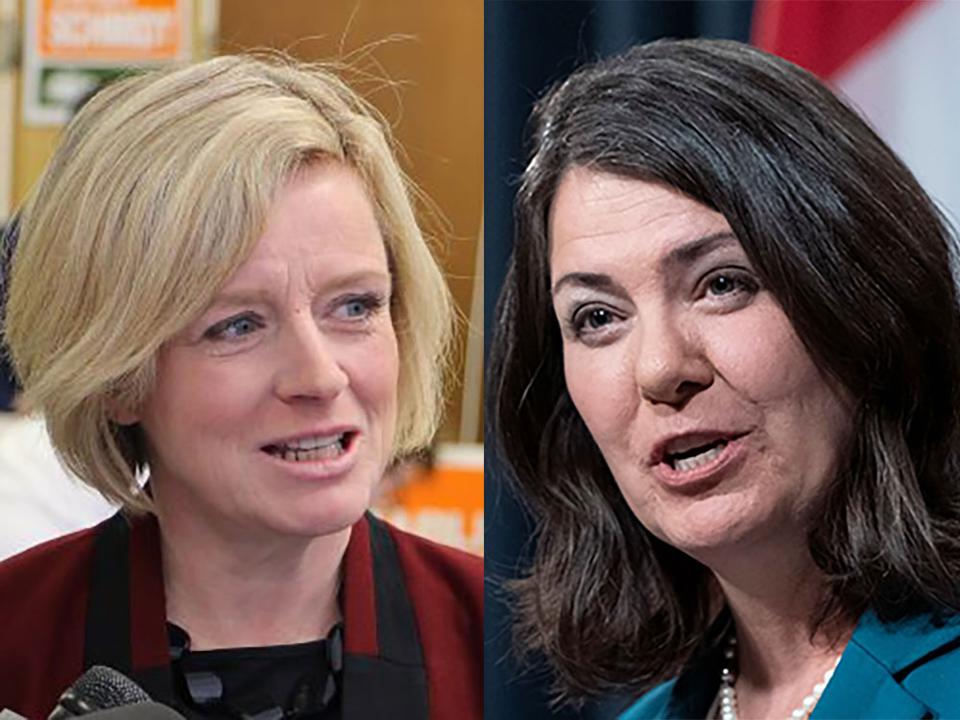On Thursday evening, two women will take to their podiums to present very different visions for the future of Alberta.
This isn’t the first time two women have competed to become premier of Alberta. In 2012, Progressive Conservative leader Allison Redford faced off against Wild Rose leader Danielle Smith. Although they were the main competitors in that debate, there were three men on stage with them, leading the NDP, the Liberal and the Alberta Party.
Alberta has had more women premiers than any other province in Canada: Redford, Notley and now Smith. And the only thing that’s certain about the outcome of the 2023 election is that the next premier will be a woman.
With its politics dominated by women, Alberta must be a feminist paradise, right?
Well, not so fast.
Although both the UCP and the NDP have women as leaders, they have very different views of gender equity, women’s role in the economy and even women’s involvement in politics. And this should come as no surprise, as there are large and persistent gender gaps in support for the two parties.
The United Conservative Party was Jason Kenney’s brainchild — a merger of the old PC and Wild Rose parties that quickly became his own political vehicle. Under Kenney, the UCP was the "bro party" of Alberta. His focus on "jobs, pipelines, economy" was routinely performed against a backdrop of workers — mostly men — wearing hard hats and blue coveralls.
Kenney’s inner circle was predominantly male. At one point, the cabinet minister responsible for the status of women was Ron Orr (although there was a woman who served as associate minister responsible for status of women).
The selection of Danielle Smith as the new UCP leader signalled a change in rhetoric, if not in representation. Aware that the party she now led lagged significantly in support from women, Smith has spoken about the need for compassion and has tried to address some of the issues that resonate with women: she increased Assured Income for the Severely Handicapped, or AISH payments, funding for health care and tried to appeal to moms through affordability payments for parents.
The UCP platform page even trumpets a commitment to $10/day child care as a key campaign promise (fulfilling the province’s agreement with the federal government it loves to vilify).
But the policy changes were not accompanied by any commitments to ensure women’s voices would be heard in a UCP government. When Smith appointed her cabinet, it included only four women (plus Smith), the lowest number of women appointed since 2006. In the 2019 election, the UCP ran 27 women candidates; in 2023, it is running only 19.
Take Back Alberta, the group that is trying to influence the UCP by winning representation on its board and by mobilizing supporters for its affiliated nomination contestants, was supportive of Danielle Smith’s bid for the UCP leadership. The group’s leader, David Parker, pointed to this support last week after a video leaked in which he bemoaned modern women’s inclination to put career ahead of procreation.
In contrast, Notley’s NDP has nominated 44 women as candidates, making up just over half its roster. Many of the highest-profile MLAs and candidates are women, including Rakhi Pancholi, Janis Irwin and Shannon Phillips. The NDP was the first Alberta government to appoint a minister responsible for the status of women, and the party is a reliable advocate for child care, action on violence against women and reproductive freedom.
If anything, the NDP’s problem is expanding its support among men. An Ipsos poll taken early in the campaign found the NDP leading by nine points among women, but the UCP leading by a stunning 17 points among men. Other polls find gaps in the same direction, but not of the same magnitude.
The issues over which the UCP has "ownership" are the issues that tend to motivate men’s voting choices: jobs, the economy and fiscal prudence. The NDP has to convince men that an NDP government would not create a wave of disproportionately male unemployment in the resource sector. Many of the ads aimed at the NDP are designed to play on these anxieties.
When Smith and Notley step up to their podiums on Thursday night, they will be offering very different approaches to government. Smith’s bid is to be the compassionate female face of a party deeply concerned with issues that matter most to men. Notley is offering to lead a gender-equal government concerned with equality and representation of the province’s diversity, but not threatening the prosperity that Albertans of both genders value.
The Tyee recommends University of Calgary political science professor Lisa Young’s What Now?!? newsletter and substack on Alberta politics. ![]()
















Tyee Commenting Guidelines
Comments that violate guidelines risk being deleted, and violations may result in a temporary or permanent user ban. Maintain the spirit of good conversation to stay in the discussion and be patient with moderators. Comments are reviewed regularly but not in real time.
Do:
Do not: